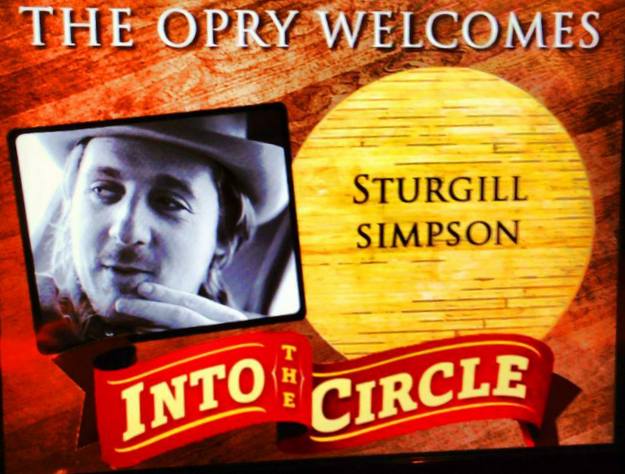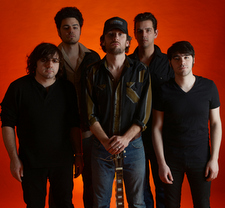I feel as if I was part of rare treat being able to see Sturgill Simpson a few years back in his older project Sunday Valley. Had never heard of the band but a few folks said to stick around and check them out. This was down in Texas during SXSW of 2011 and happened at a showcase put on by Keith of Hillgrass Bluebilly and Trigger of Saving Country Music. As soon as hit those first notes on the guitar and let loose a signature sound I was hooked.
Now Sturgill has gone solo and stripped back on the guitar shredding and focused more on the craft of songwriting and is truly upping the ante. I sure as hell hope that he doesn't leave his amazing style of guitar picking in the dust as it is a breath of fresh air and a shot in the arm that brings country rock into a new light.
Check out the article on Saving Country Music
 |
| Sturgill Simpson, one of underground country music's best kept secrets |
"But Sturgill’s Opry debut may have an even greater personal significance. To explain, here is Sturgill Simpson on his Opry debut, in his own words.
- – - – - – - – - -
I credit my 82 yr. old Grandfather Dood Fraley more than anyone on Earth for, among many other things, my musical education. He’s the greatest man I’ve ever known…Period.
He used to sit me on the couch next to him when I was a child and make me watch Hee-Haw and TNN and tell me which performers were good and which ones were a joke or just holding the guitar as a prop. He spent his entire childhood growing up in Eastern Kentucky so poor it can’t be put into words. They had one radio in the coal camp that every one would gather around every Saturday night and listen to The Grand Ole Opry. He always talked about how The Opry was like magic coming out of that box. I know what it feels like hearing Bill Monroe for the first time on a cd player but it’s tough to imagine what it must have been like hearing that voice blast out of a radio in the 40′s as a nine year old boy. Anyway, he’s been really sick lately so when I got the news he was the first person I called…his words summed it up better than I ever could.
He told me, “That’s it bud..that’s the biggest honor in Country music..that’s what you’ve been working so hard for all these years whether you knew it or not. If you never sing or record another note, you ain’t gotta prove nothing else to nobody after that. Don’t worry about what they’re doing now, just go do it your way and I’ll be right there with ya."
I made my album for him and no one else and it got me “here”…It aint much but “here” is a place I can go to sleep at night feeling pretty ok with. There is really nothing I can say that captures how proud I feel knowing he lived to see this and that he’ll be standing backstage watching his grandson step into that circle just like every single damn one of the heroes he raised me on has before me. There’s not a whole hell of a lot in this world I take seriously, least of all myself. But this I do,..The Opry is a living testament to the heritage of American Country Music and that’s about as serious as anything can be.
- – - – - – - – - – - – - – - – - – - – - – - – - – - – - -
You can listen to Sturgill Simpson’s Opry debut on WSM Online between 7 PM and 9:15 PM Central Friday (8-23).
UPDATE (8/23): Sturgill played “Water I A Well” and “Life Ain’t Fair & The World Is Mean” on the Opry. For those that missed it, it will be archived in about a week or so here:
Here’s a few pictures:
Picture from backstage:
Sturgill Simpson Tour Dates:
Sept. 1 – Rosemary Beach – Rosemary Beach, FL
Sept. 4 – The Altamont – Asheville, NC
Sept. 5 – Scenic City Roots – Chattanooga, TN
Sept. 6 – The New Vintage – Louisville
Sept. 7 – Barley’s Tap Room – Knoxville, TN
Sept. 8 – Eddie’s Attic – Atlanta
Sept. 9 – Georgia Theatre, Rooftop Series – Athens, GA
Sept. 11 – The Evening Muse – Charlotte
Sept. 12 – The Pour House Music Hall – Raleigh, NC
Sept. 19 – Americana Music Festival – Nashville
Sept. 21 – The Groove – Nashville
Sept. 26 – Red Dirt Dance Hall – Tulsa, OK
Sept. 27 – Wormy Dog Saloon – Oklahoma City
Sept. 28 – The Foundry – Dallas
Oct. 1 – The Western – Scottsdale, AZ
Oct. 3 – The Griffin – San Diego
Oct. 3 – The Hotel Cafe – Los Angeles
Oct. 5 – Hardly Strictly Bluegrass Festival – San Francisco
Oct. 30 – Music City Roots – Nashville




















